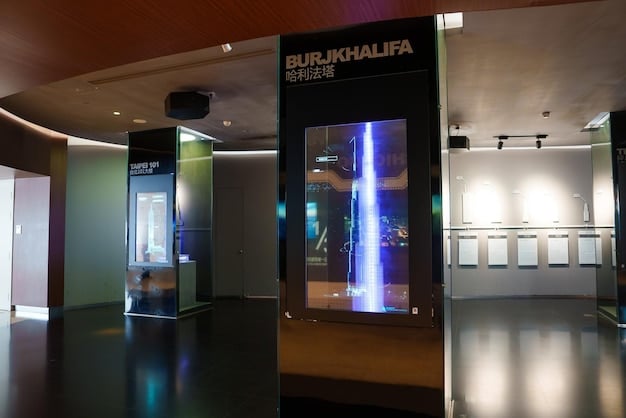Social Media’s Impact on Film Marketing: A 2025 Case Study

The Influence of Social Media on Film Marketing: A 2025 Case Study reveals how integrated digital strategies, personalized content, and interactive experiences are essential for film promotion in the evolving landscape of social media.
The film industry is rapidly evolving, and so is the way movies are marketed. By 2025, the Influence of Social Media on Film Marketing: A 2025 Case Study will be even more pronounced, demanding innovative strategies to capture audience attention and drive box office success.
Social Media Dominance in Film Promotion
Social media has already heavily reshaped how films are promoted. But as we move toward 2025, it’s set to become even more critical. The digital landscape is continually changing, making it vital for film marketers to stay ahead.
Understanding audience behavior and preferences will be key to crafting successful campaigns. This means leveraging data analytics to gain insights into what resonates with different segments of the population.
The Shift to Digital Marketing
Traditional marketing methods are making way for digital strategies. Social media platforms provide direct lines of communication with potential viewers, offering unparalleled opportunities for engagement.
With the rise of streaming services, the traditional concepts of box office success are evolving. Social media marketing must also adjust to highlight digital releases and on-demand availability.
- Personalized advertising is becoming the norm, with algorithms delivering tailored content.
- Interactive campaigns on platforms like TikTok, Instagram, and X are driving engagement.
- Influencer marketing is gaining traction with influencers promoting the films to their followers.
Effective social media strategies not only create buzz but also drive meaningful interactions. Campaigns designed to encourage sharing and discussions enhance the film’s visibility.
The Power of Personalized Content
In 2025, generic marketing messages will no longer cut it. Audiences expect personalized content that speaks to their specific interests and values. Film marketers must create strategies that deliver this tailored experience.
Personalization goes beyond simply using someone’s name in an email. It involves understanding their past behaviors and recommending content that aligns with their preferences.

Advanced Data Analytics
Data analytics tools are becoming more sophisticated, allowing marketers to gather deeper insights. These tools can track everything from viewing habits to social media interactions.
AI-driven personalization engines analyze data in real-time to customize content. This ensures that each viewer sees a version of the trailer that resonates with them.
Predictive analytics help marketers anticipate audience responses to different marketing messages. This allows for more targeted and effective campaigns.
By leveraging data analytics, film marketers can create highly personalized experiences. This not only increases engagement but also drives conversions.
Interactive Experiences and Augmented Reality
The lines between the real world and digital reality are blurring. Interactive experiences and augmented reality (AR) are becoming integral parts of film marketing. AR allows for immersive experiences that engage audiences in new ways.
Interactive campaigns encourage active participation. This helps create a deeper connection with the film and its characters.
- AR filters on social platforms allow users to interact with characters and scenes.
- Virtual reality experiences transport viewers into the world of the film.
- Interactive Q&A sessions with the cast and crew drive engagement.
These immersive experiences boost film awareness and promote user-generated content. Social media sharing of AR experiences amplifies the reach of the marketing campaign.
The Role of Influencers and Content Creators
Influencers and content creators play a crucial role in film marketing. They have the ability to reach niche audiences and drive authentic engagement. Their endorsements can significantly impact a film’s popularity.
Collaborations with the influencers must be strategic. They must align with the target audience and the film’s theme.

Authenticity and Engagement
Authenticity is key when partnering with influencers. Audiences can easily spot inauthentic endorsements, which can damage a film’s reputation.
Engagement rates are essential metrics for evaluating the effectiveness of influencer campaigns. High engagement indicates that the content resonates with the audiences.
Influencers can provide exclusive behind-the-scenes content. This gives the audiences a unique look at the making of the film.
The credibility of influencers greatly impacts their ability to drive ticket sales. Marketers must carefully select the influencers with a solid reputation.
Social Listening and Sentiment Analysis
Monitoring conversations and analyzing sentiments are crucial components of modern film marketing. Understanding what people are saying online can help marketers refine their strategies and address concerns.
Social listening tools track mentions of the film across different platforms. This provides a comprehensive overview of public perception.
Adapting to Feedback
Sentiment analysis uses AI to determine the emotional tone of online conversations. This helps marketers gauge whether the public sentiment is positive, negative, or neutral.
By monitoring discussions, marketers can identify the aspects of the film that resonate with the audience. They can also address any negative feedback quickly.
- Adapting marketing messages based on real-time feedback ensures that campaigns stay aligned with public opinion.
- Addressing concerns proactively helps maintain a positive brand reputation.
- Gathering insights from social listening can inform future marketing strategies.
Social listening goes beyond just tracking mentions. It’s about understanding the underlying sentiments and turning that knowledge into actionable insights.
Measuring Success and ROI
Measuring the success of social media marketing campaigns is more important than ever. Film marketers need to track the right metrics to determine ROI. This allows for better resource allocation and more informed decision-making.
Key performance indicators (KPIs) should align with the marketing objectives. They may include ticket sales, social media engagement, and brand mentions.
Key Metrics to Track
Conversion rates measure the number of people who take a desired action, such as buying a ticket. Tracking these rates helps determine the effectiveness of the marketing efforts.
Engagement metrics include likes, shares, comments, and mentions. They provide insights into how audiences interact with the content.
Brand mentions assess the volume and sentiment of online conversations about the film. This helps gauge overall brand awareness and perception.
Cost per acquisition (CPA) measures the cost of acquiring a new customer. Analyzing CPA helps determine the efficiency of the marketing spend.
| Key Point | Brief Description |
|---|---|
| 🎬 Social Media Dominance | Social media reshaping film promotion with digital strategies. |
| 🎯 Personalized Content | Tailoring content to audience interests using data analytics. |
| 👓 Interactive Experiences | Using AR and VR for deeper audience engagement. |
| 📣 Influencer Marketing | Collaborating with influencers for authentic endorsements. |
Frequently Asked Questions
▼
Social media has enabled direct engagement with audiences, personalized advertising, and real-time feedback, shifting from traditional marketing methods to digital strategies.
▼
Personalized content caters to individual interests, increasing engagement and driving conversions by delivering tailored experiences based on viewing habits and preferences.
▼
Influencers reach niche audiences, drive engagement, and provide authentic endorsements. Strategic collaborations with them can significantly impact a film’s reach and popularity.
▼
Sentiment analysis helps marketers understand the emotional tone of online discussions about a film, allowing them to adjust strategies and address concerns based on real-time feedback.
▼
Key metrics include conversion rates, engagement metrics (likes, shares, comments), brand mentions, and cost per acquisition (CPA) to assess the effectiveness and efficiency of marketing efforts.
Conclusion
As we look toward 2025, the influence of social media on film marketing will only continue to grow. By embracing digital strategies, personalized content, interactive experiences, and data-driven insights, film marketers can successfully engage audiences and drive box office success.





